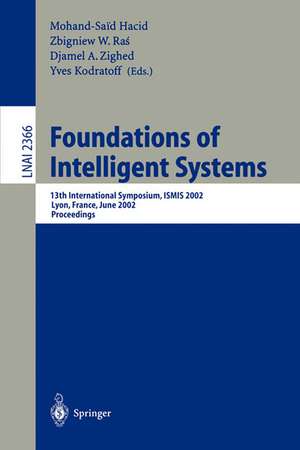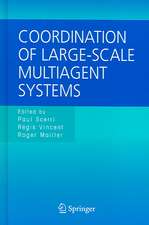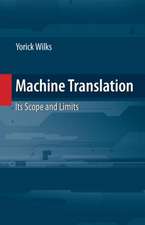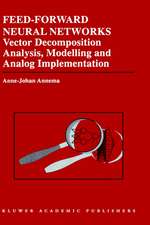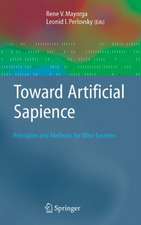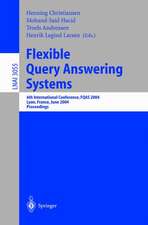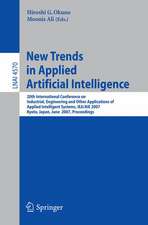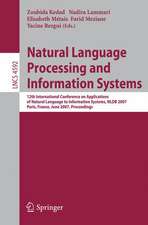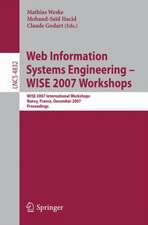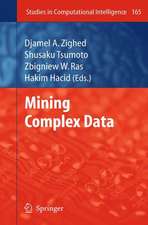Foundations of Intelligent Systems: 13th International Symposium, ISMIS 2002, Lyon, France, June 27-29, 2002. Proceedings: Lecture Notes in Computer Science, cartea 2366
Editat de Mohand-Said Hacid, Zbigniew W. Ras, Djamel A. Zighed, Yves Kodratoffen Limba Engleză Paperback – 12 iun 2002
Din seria Lecture Notes in Computer Science
- 20%
 Preț: 1061.55 lei
Preț: 1061.55 lei - 20%
 Preț: 307.71 lei
Preț: 307.71 lei - 20%
 Preț: 438.69 lei
Preț: 438.69 lei - 20%
 Preț: 645.28 lei
Preț: 645.28 lei -
 Preț: 410.88 lei
Preț: 410.88 lei - 15%
 Preț: 580.46 lei
Preț: 580.46 lei - 17%
 Preț: 427.22 lei
Preț: 427.22 lei - 20%
 Preț: 596.46 lei
Preț: 596.46 lei -
 Preț: 449.57 lei
Preț: 449.57 lei - 20%
 Preț: 353.50 lei
Preț: 353.50 lei - 20%
 Preț: 1414.79 lei
Preț: 1414.79 lei - 20%
 Preț: 309.90 lei
Preț: 309.90 lei - 20%
 Preț: 583.40 lei
Preț: 583.40 lei - 20%
 Preț: 1075.26 lei
Preț: 1075.26 lei - 20%
 Preț: 310.26 lei
Preț: 310.26 lei - 20%
 Preț: 655.02 lei
Preț: 655.02 lei - 20%
 Preț: 580.93 lei
Preț: 580.93 lei - 20%
 Preț: 340.32 lei
Preț: 340.32 lei - 18%
 Preț: 938.83 lei
Preț: 938.83 lei - 20%
 Preț: 591.51 lei
Preț: 591.51 lei - 15%
 Preț: 438.59 lei
Preț: 438.59 lei - 20%
 Preț: 337.00 lei
Preț: 337.00 lei -
 Preț: 389.48 lei
Preț: 389.48 lei - 20%
 Preț: 607.39 lei
Preț: 607.39 lei - 20%
 Preț: 1024.44 lei
Preț: 1024.44 lei - 20%
 Preț: 579.30 lei
Preț: 579.30 lei - 20%
 Preț: 763.23 lei
Preț: 763.23 lei - 20%
 Preț: 453.32 lei
Preț: 453.32 lei - 20%
 Preț: 575.48 lei
Preț: 575.48 lei - 20%
 Preț: 585.88 lei
Preț: 585.88 lei - 20%
 Preț: 825.93 lei
Preț: 825.93 lei - 20%
 Preț: 763.23 lei
Preț: 763.23 lei - 17%
 Preț: 360.19 lei
Preț: 360.19 lei - 20%
 Preț: 1183.14 lei
Preț: 1183.14 lei - 20%
 Preț: 340.32 lei
Preț: 340.32 lei - 20%
 Preț: 504.57 lei
Preț: 504.57 lei - 20%
 Preț: 369.12 lei
Preț: 369.12 lei - 20%
 Preț: 583.40 lei
Preț: 583.40 lei - 20%
 Preț: 343.62 lei
Preț: 343.62 lei - 20%
 Preț: 350.21 lei
Preț: 350.21 lei - 20%
 Preț: 764.89 lei
Preț: 764.89 lei - 20%
 Preț: 583.40 lei
Preț: 583.40 lei - 20%
 Preț: 649.49 lei
Preț: 649.49 lei - 20%
 Preț: 341.95 lei
Preț: 341.95 lei - 20%
 Preț: 238.01 lei
Preț: 238.01 lei - 20%
 Preț: 538.29 lei
Preț: 538.29 lei
Preț: 661.79 lei
Preț vechi: 827.24 lei
-20% Nou
Puncte Express: 993
Preț estimativ în valută:
126.63€ • 132.57$ • 104.78£
126.63€ • 132.57$ • 104.78£
Carte tipărită la comandă
Livrare economică 05-19 aprilie
Preluare comenzi: 021 569.72.76
Specificații
ISBN-13: 9783540437857
ISBN-10: 3540437851
Pagini: 628
Ilustrații: XII, 616 p.
Dimensiuni: 152 x 229 x 33 mm
Greutate: 0.87 kg
Ediția:2002
Editura: Springer Berlin, Heidelberg
Colecția Springer
Seriile Lecture Notes in Computer Science, Lecture Notes in Artificial Intelligence
Locul publicării:Berlin, Heidelberg, Germany
ISBN-10: 3540437851
Pagini: 628
Ilustrații: XII, 616 p.
Dimensiuni: 152 x 229 x 33 mm
Greutate: 0.87 kg
Ediția:2002
Editura: Springer Berlin, Heidelberg
Colecția Springer
Seriile Lecture Notes in Computer Science, Lecture Notes in Artificial Intelligence
Locul publicării:Berlin, Heidelberg, Germany
Public țintă
ResearchCuprins
Invited Papers.- Knowledge Representation for Information Integration.- Infrastructure and Interoperability for Agent-Mediated Services.- Improving Classification by Removing or Relabeling Mislabeled Instances.- Incremental Learning with Partial Instance Memory.- KDD-Based Approach to Musical Instrument Sound Recognition.- Learning Significant Alignments: An Alternative to Normalized Local Alignment.- Intelligent User Interface and Ontologies.- A Plausibility Description Logics for Reasoning with Information Sources Having Different Formats and Structures.- Roles of Ontologies for Web Intelligence.- Handling Semantic Inconsistencies in Distributed Knowledge Systems Using Ontologies.- Structured Ontology and Information Retrieval for Email Search and Discovery.- Learning and Knowledge Discovery.- Conceptual Clustering of Heterogeneous Sequences via Schema Mapping.- Is a Greedy Covering Strategy an Extreme Boosting?.- Acquisition of a Knowledge Dictionary from Training Examples Including Multiple Values.- Mining Bayesian Network Structure for Large Sets of Variables.- Logic for Artificial Intelligence.- Automatic Generation of Trivia Questions.- Answering Queries Addressed to Several Databases: A Query Evaluator which Implements a Majority Merging Approach.- Minimal Generalizations under OI-Implication.- I-Search: A System for Intelligent Information Search on the Web.- Knowledge Representation, Reasoning, Integration.- Four-Valued Knowledge Augmentation for Representing Structured Documents.- WISECON — An Intelligent Assistant for Buying Computers on the Internet.- Basic Semantics of the Logic of Plausible Reasoning.- Logic-Based Reasoning on Delegatable Authorizations.- Intelligent Information Retrieval.- Mixing Selections and Foreign Key Joins in Queries againstPossibilistic Databases.- Aggregates as Meta Functions.- A Knowledge-Based Approach to Querying Heterogeneous Databases.- Using User Profiles in Intelligent Information Retrieval.- Learning and Knowledge Discovery.- Partition-Refining Algorithms for Learning Finite State Automata.- Computing Full and Iceberg Datacubes Using Partitions.- A Dynamic Approach to Dimensionality Reduction in Relational Learning.- Incremental and Dynamic Text Mining.- Logic for Artificial Intelligence.- A Logic Framework for the Integration of Databases.- Inference for Annotated Logics over Distributive Lattices.- Disjunctive Logic Programs with Inheritance Revisited.- Knowledge Constructions for Artificial Intelligence.- Methodologies and Soft Computing.- Validation and Reparation of Knowledge Bases.- Automated Discovery of Decision Rule Chains Using Rough Sets and Medical Diagnostic Model.- Inheriting Parents Operators: A New Dynamic Strategy for Improving Evolutionary Algorithms.- Intelligent User Interfaces.- An Intelligent Web Recommendation System: A Web Usage Mining Approach.- Porphyry 2001: Semantics for Scholarly Publications Retrieval.- Preprocessor to Improve Performance of GA in Determining Bending Process for Sheet Metal Industry.- Knowledge Representation, Reasoning, Integration.- Recognizing and Discovering Complex Events in Sequences.- Why to Apply Generalized Disjunction-Free Generators Representation of Frequent Patterns?.- Trading-Off Local versus Global Effects of Regression Nodes in Model Trees.- Intelligent Information Systems.- An Efficient Intelligent Agent System for Automated Recommendation in Electronic Commerce.- Matching an XML Document against a Set of DTDs.- Decision Tree Modeling with Relational Views.- Learning and Knowledge Discovery.- Discovering SequentialAssociation Rules with Constraints and Time Lags in Multiple Sequences.- Mining Association Rules in Preference-Ordered Data.- Unknown Attribute Values Processing by Meta-learner.- Intelligent Information Retrieval.- Intelligent Buffer Cache Management in Multimedia Data Retrieval.- A Logical Formalization of Semistructured Data Models.- Solving Travel Problems by Integrating Web Information with Planning.- Methodologies.- A Framework for Generating Task Specific Information Extraction Systems.- A Formal Framework for Reasoning on UML Class Diagrams.- A Biological Approach to the Development of Computer Autoimmune Systems.- Intelligent User Interfaces.- Adaptive Layout Analysis of Document Images.- A NLG-Based Presentation Method for Supporting KDD End-Users.- A Tool Supported Structured Method for Planning Domain Acquisition.- Intelligent Information Systems.- Probabilistic Aggregates.- Samples for Understanding Data-Semantics in Relations.- Cooperation of Multiple Strategies for Automated Learning in Complex Environments.- Learning and Knowledge Discovery.- Classifier Fusion Using Local Confidence.- Feature Selection for Ensembles of Simple Bayesian Classifiers.- Data Squashing for Speeding Up Boosting-Based Outlier Detection.
Caracteristici
Includes supplementary material: sn.pub/extras
